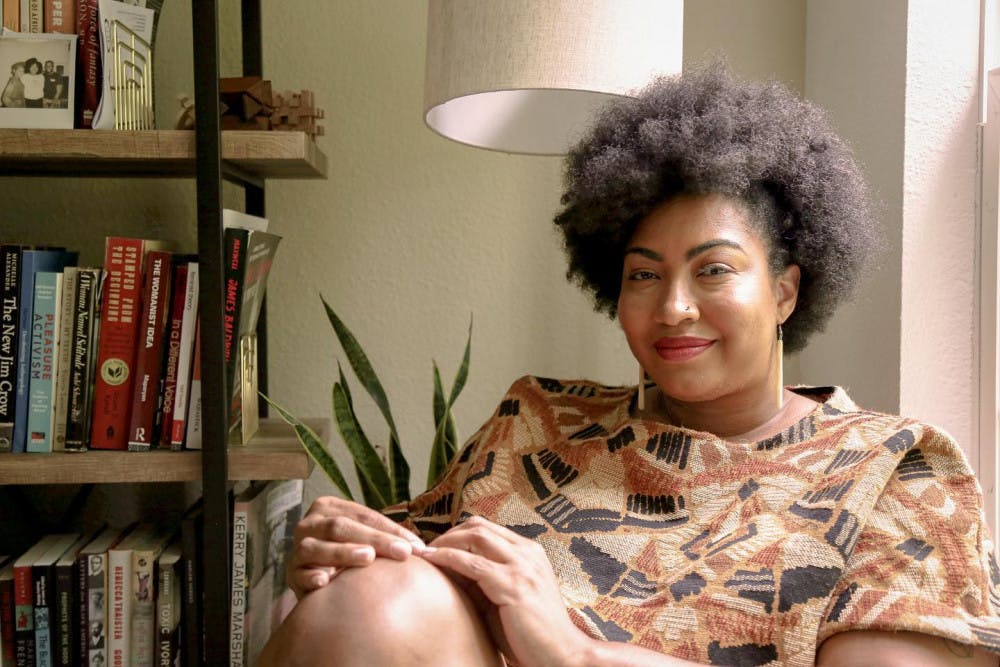Rachel Cargle is not interested in “spoonfeeding” racial justice to her audiences. Instead, she engages in conversation with them and challenges them to think critically about the systems they participate in — systems, she said, that uphold white supremacy.
That’s the framework through which Cargle, a public academic, activist and writer from Akron, Ohio, delivered Mercer University’s Women’s History Month address Tuesday. Her talk, called “For Your Consideration,” drew on her work providing discourse and resources for examining the intersection of race and womanhood.
“I love this particular presentation because it’s less about the academics and more about the emotional intelligence, and more about the deeper considerations for how we show up in the world,” Cargle said.
More than 270 people attended Cargle’s talk, which was held via Zoom.
Cargle asked audience members to reflect on ways that the United States established its culture of white supremacy and continues to maintain it. She encouraged attendees to consider their privilege in society, whether based on race, color, gender identity, economic status or ability.
She also challenged white people to consider how they perpetuate systems of oppression; for example, by refusing to talk to other white people about racial justice because the conversation may feel uncomfortable.
“Whiteness is the reason why Black people aren’t being cared for. Whiteness is the reason why Black people aren’t being centered,” she said. “The discomfort is nothing compared to the injustices that people are facing… Actual lives are on the line.”
Cargle also detailed the racist legacy of significant institutions — such as medicine, law, journalism and education — as well as the feminist movement.
“The critical interrogation I suggest everyone ask of themselves is, ‘what type of woman fits into my feminism?’” she asked. “When you think of feminism, when you think of who you’re fighting for, what does that look like? Does that look like you? Does it look like whiteness?”
She discussed the origins of the American feminist movement, led by white suffragists Susan B. Anthony, Carrie Chapman Catt and Elizabeth Cady Stanton.
She told listeners that Catt, when advocating for women’s right to vote, said that “white supremacy will be strengthened, not weakened, by women’s suffrage.” And in their newsletter, Anthony and Stanton wrote, “if intelligence, justice and morality are to have precedence in the government, let the question of the woman be brought up first and that of the negro last.”
The racist history of excluding Black women from white feminists’ understanding of womanhood persists in the movement today, Cargle said.
As an example, she described her experience at the National Women’s March in 2017, a majority-white event protesting the inauguration of former President Donald Trump. Cargle worked as a nanny at the time, and while her employer gave her time off for the march, she said many of the other nannies she knew — most of them women of color — were not given time off to attend the march because their white women employers wanted to go instead.
Most of the white women at the march, she said, were protesting what they saw as a threat to women’s rights, but had never protested the violations of the rights of women of color.
“It made me think: where were they when Indigenous women were fighting for their water? Where were they when Black mothers were in the streets fighting for their children not to be shot by police on sight?” Cargle said. “Where were all of these women when women’s issues were happening to women who did not look like white women?”
Shifting the conversation specifically to the Mercer community, Cargle asked Mercer students who are not Black women to share how they would feel if they woke up as Black women on campus the next day. When most of the responses indicated fear or nervousness, she told them to consider how they contributed to a campus community that made Black women feel that way.
“You know what’s happening. You know that a Black person would naturally feel fearful to walk out of their room, to walk out onto their campus. So what does that tell you about you? What does it tell you about you if you are calling out a truth, yet haven’t acted on it?” she said.
Cargle’s lecture was hosted by Mercer’s departments of women’s and gender studies, Africana studies, biology, integrative studies, international and global studies, political science, psychology and sociology as well as QuadWorks, the Office of Diversity and Inclusion Initiatives and Wesleyan College.
In addition to her work as a writer and speaker, Cargle is the founder of the Loveland Foundation, a nonprofit organization providing free therapy to Black women and girls, and The Great Unlearn, an online community focused on telling the complete story of race in America by elevating the work of Black academics.
She recently opened Elizabeth’s Bookshop and Writing Centre, an online independent bookstore celebrating the work of writers from marginalized backgrounds. Her own book, “I Don’t Want Your Love and Light,” is set to publish in 2021.
Cargle can also be found on Instagram.
Activist Rachel Cargle asks Mercer students to consider their roles in upholding white supremacy

Rachel Cargle via Facebook




